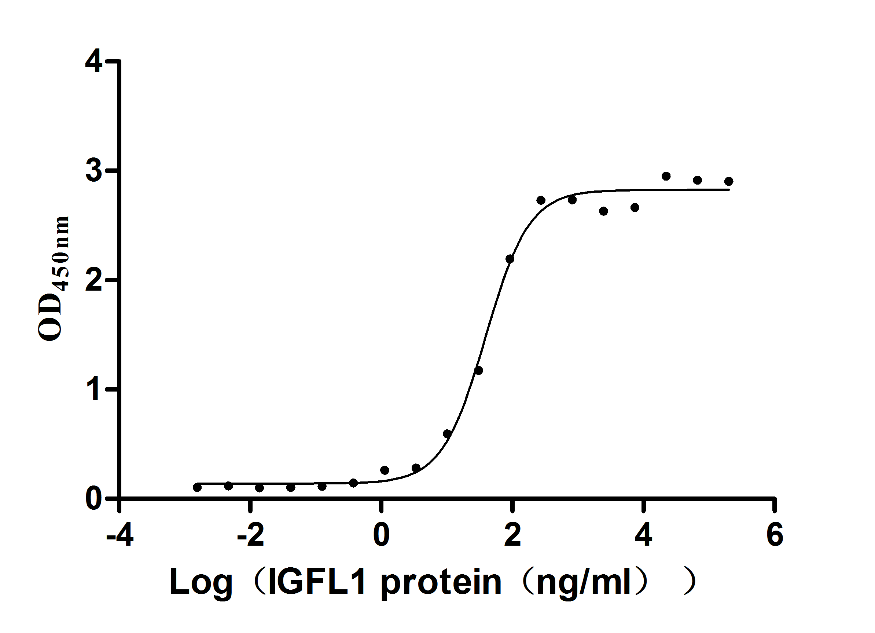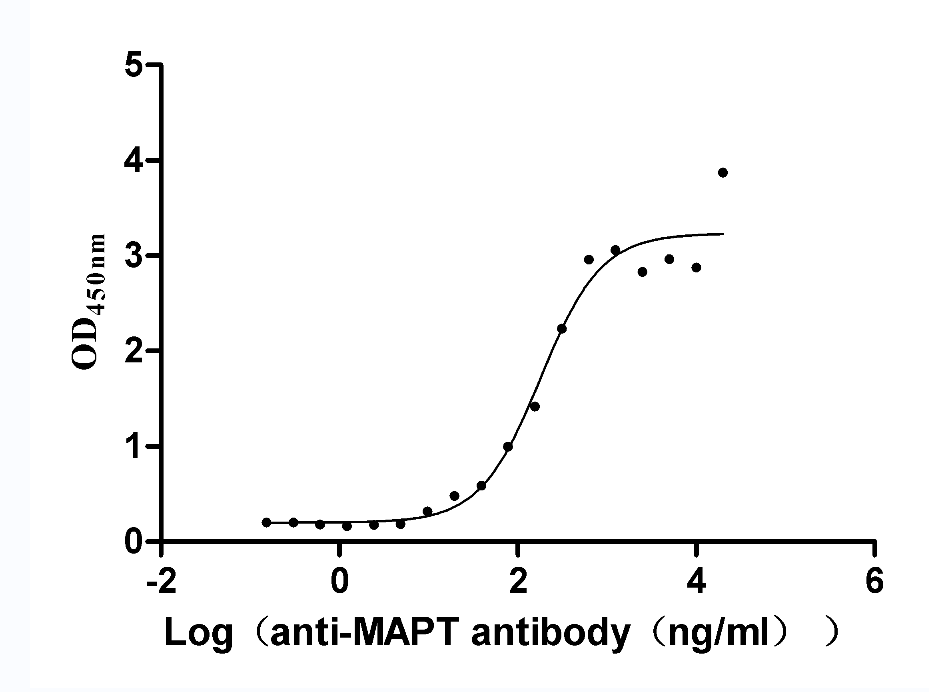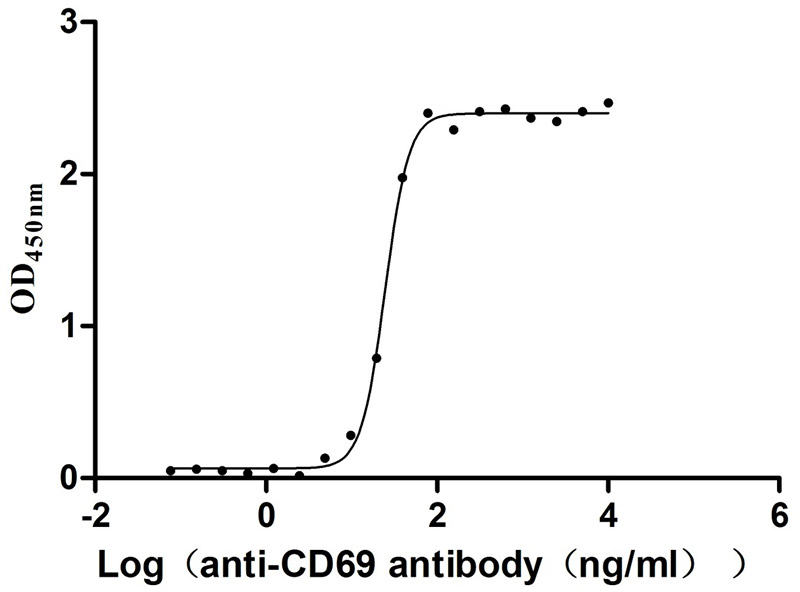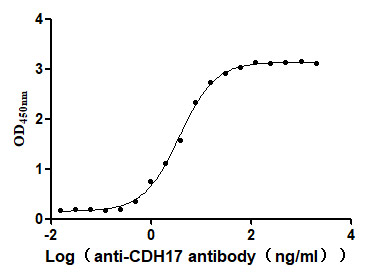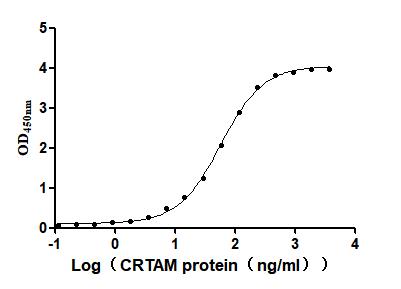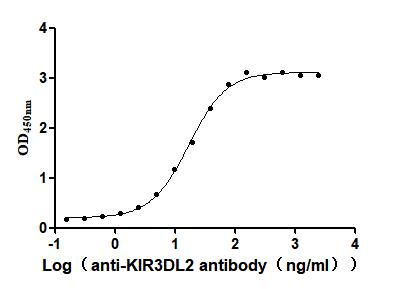Recombinant Human Sodium-dependent phosphate transporter 2 (SLC20A2), partial
-
货号:CSB-YP600854HU
-
规格:
-
来源:Yeast
-
其他:
-
货号:CSB-EP600854HU
-
规格:
-
来源:E.coli
-
其他:
-
货号:CSB-EP600854HU-B
-
规格:
-
来源:E.coli
-
共轭:Avi-tag Biotinylated
E. coli biotin ligase (BirA) is highly specific in covalently attaching biotin to the 15 amino acid AviTag peptide. This recombinant protein was biotinylated in vivo by AviTag-BirA technology, which method is BriA catalyzes amide linkage between the biotin and the specific lysine of the AviTag.
-
其他:
-
货号:CSB-BP600854HU
-
规格:
-
来源:Baculovirus
-
其他:
-
货号:CSB-MP600854HU
-
规格:
-
来源:Mammalian cell
-
其他:
产品详情
-
纯度:>85% (SDS-PAGE)
-
基因名:SLC20A2
-
Uniprot No.:
-
别名:Gibbon ape leukemia virus receptor 2; Gibbon leukemia virus receptor 2; GLVR 2; GLVR-2; GLVR2; hPit2; IBGC3; MLVAR; Murine leukemia virus amphotropic receptor; murine leukemia virus, amphotropic, receptor for; Phosphate transporter 2; PIT 2; PiT-2; Pit2; RAM1; S20A2_HUMAN; SLC20A2; Sodium-dependent phosphate transporter 2; Solute carrier family 20 (phosphate transporter) member 2; solute carrier family 20 (phosphate transporter), member 2; Solute carrier family 20 member 2
-
种属:Homo sapiens (Human)
-
蛋白长度:Partial
-
蛋白标签:Tag type will be determined during the manufacturing process.
The tag type will be determined during production process. If you have specified tag type, please tell us and we will develop the specified tag preferentially. -
产品提供形式:Lyophilized powder
Note: We will preferentially ship the format that we have in stock, however, if you have any special requirement for the format, please remark your requirement when placing the order, we will prepare according to your demand. -
复溶:We recommend that this vial be briefly centrifuged prior to opening to bring the contents to the bottom. Please reconstitute protein in deionized sterile water to a concentration of 0.1-1.0 mg/mL.We recommend to add 5-50% of glycerol (final concentration) and aliquot for long-term storage at -20℃/-80℃. Our default final concentration of glycerol is 50%. Customers could use it as reference.
-
储存条件:Store at -20°C/-80°C upon receipt, aliquoting is necessary for mutiple use. Avoid repeated freeze-thaw cycles.
-
保质期:The shelf life is related to many factors, storage state, buffer ingredients, storage temperature and the stability of the protein itself.
Generally, the shelf life of liquid form is 6 months at -20°C/-80°C. The shelf life of lyophilized form is 12 months at -20°C/-80°C. -
货期:Delivery time may differ from different purchasing way or location, please kindly consult your local distributors for specific delivery time.Note: All of our proteins are default shipped with normal blue ice packs, if you request to ship with dry ice, please communicate with us in advance and extra fees will be charged.
-
注意事项:Repeated freezing and thawing is not recommended. Store working aliquots at 4°C for up to one week.
-
Datasheet :Please contact us to get it.
相关产品
靶点详情
-
功能:Sodium-phosphate symporter which seems to play a fundamental housekeeping role in phosphate transport by absorbing phosphate from interstitial fluid for normal cellular functions such as cellular metabolism, signal transduction, and nucleic acid and lipid synthesis. In vitro, sodium-dependent phosphate uptake is not significantly affected by acidic and alkaline conditions, however sodium-independent phosphate uptake occurs at acidic conditions. May play a role in extracellular matrix, cartilage and vascular calcification. Functions as a retroviral receptor and confers human cells susceptibility to infection to amphotropic murine leukemia virus (A-MuLV), 10A1 murine leukemia virus (10A1 MLV) and some feline leukemia virus subgroup B (FeLV-B) variants.
-
基因功能参考文献:
- A Novel SLC20A2 Mutation Associated with Familial Idiopathic Basal Ganglia Calcification and Analysis of the Genotype-Phenotype Association in Chinese Patients PMID: 29578123
- This study demonstrated that the frequently mutated gene is SLC20A2 caused primary familial brain calcifications where mutations can affect any domain of the protein. PMID: 29325620
- The established IBGC-iPSCs carried SLC20A2 c.1848G>A mutation (p.W616* of translated protein PiT2), and also showed typical iPSC morphology, pluripotency markers, normal karyotype, and the ability of in vitro differentiation into three-germ layers. PMID: 29034894
- SLC20A2 expression is reduced in the primary brain familiar calcification patients carrying SLC20A2 mutation. PMID: 28578517
- This review showed that SLC20A2 was the most common gene involved with 75 out of 137 cases included with brain calcification. PMID: 28162874
- Deletion of 5' noncoding region of SLC20A2 was associated with primary familial brain calcification in a Finnish family with three affected memebers. PMID: 27726124
- The identified SLC20A2 mutation resolves the genetic cause of primary familial brain calcification in the 'IBGC2' kindred, collapsing 'IBGC2' into IBGC1. PMID: 27671522
- Report sub-cellular expression analysis of mutant PiT-2 in primary cultured fibroblasts from a primary familial brain calcification patient, showing that p.Trp626_Thr629dup in SLC20A2 alters PiT-2 sub-cellular localization and reduces Pi-uptake, leading to onset of PFBC in our patient. PMID: 28722801
- Deletions of exon 2 of SLC20A2 identified in two unrelated patients segregated with primary brain calcification. PMID: 27245298
- In mouse cells, the SLC20A2 brain calcification causal missense mutations exert their effect in a dominant negative manner resulting in decreased wild-type PiT2 Pi transport. PMID: 27943094
- This study presented the Primary familial brain calcification in a Norwegian family, caused by a novel SLC20A2 gene mutation. PMID: 26860091
- SLC20A2 variant was identified in a family with CHRNB2 mutation, brain calcifications and generalized tonic-clonic seizures. PMID: 26475232
- Lessons from SLC20A2, PDGFB, and PDGFRB mutation carriers. Three causative genes have been identified: SLC20A2, PDGFRB and, recently, PDGFB, whose associated phenotype has not yet been extensively studied. PMID: 26129893
- A summary of SLC20A2 variants reported in patients with primary familial brain calcification (review). PMID: 25726928
- Currently, mutations in SLC20A2 gene have been identified as pathogenic for Familial idiopathic basal ganglia calcification. PMID: 25906927
- The SLC20A2 mutation leading to the accumulation of calcium salts in the brain. PMID: 25686613
- Mutations in SLC20A2 are a major cause of familial idiopathic basal ganglia calcification. PMID: 25958344
- clinical, neuroimaging and genetic findings in an Italian family with idiopathic basal ganglia calcification; 2 affected family members harbored a novel missense mutation, G1618A leading to gly540-to-arg (G540R) substitution in a highly conserved residue PMID: 25348593
- This molecular analysis expands the mutational spectrum of SLC20A2, which remains the major causative gene of primary familial brain calcification. PMID: 25284758
- Familial idiopathic basal ganglia calcification caused by the SLC20A2 gene mutation can manifest as juvenile onset paroxysmal kinesigenic dyskinesia. PMID: 25636102
- The mutation of SLC20A2 cause primary familial brain calcifications. PMID: 25212438
- deletion of SLC20A2 and THAP1 may have a role in familial basal ganglia calcification with dystonia [case report and family study] PMID: 24135862
- SLC20A2 mutations are a major cause of familial idiopathic basal ganglia calcification in Japan PMID: 24463626
- SLC20A2 and PDGFRB mutations result in different idiopathic basal ganglia calcification phenotypes. PMID: 24065723
- Our study supports the hypothesis that SLC20A2 is a causative gene of Idiopathic basal ganglia calcification. PMID: 23939468
- This finding reinforces the relevance of the SLC20A2 gene to the etiopathogeny of familial idiopathic basal ganglia calcification PMID: 23406454
- we identified a novel SLC20A2 mutation, which causes a significant decrease in SLC20A2 mRNA expression. PMID: 23437308
- Our screen in a large series expands the catalog of SLC20A2 mutations identified to date and demonstrates that mutations in SLC20A2 are a major cause of familial idiopathic basal ganglia calcification. PMID: 23334463
- Mutations in the underlying disease genes ENPP1, ABCC6, NT5E, and SLC20A2, respectively, lead to arterial media calcification. PMID: 23122642
- Mutations in SLC20A2 link familial idiopathic basal ganglia calcification with phosphate homeostasis. PMID: 22327515
- forms assemblies at cell surface PMID: 11932396
- structure activity relationship of deletion mutants of Pit2 retroviral receptor [Pit2] PMID: 15308749
- the presence of an aspartic acid in either of the PiT family signature sequences is critical for the Na+-dependent P(i) transport function of human PiT2 PMID: 15955065
- Analysis of kinetics and substrate specificity of SLC20A2. PMID: 17494632
显示更多
收起更多
-
相关疾病:Basal ganglia calcification, idiopathic, 1 (IBGC1)
-
亚细胞定位:Cell membrane; Multi-pass membrane protein.
-
蛋白家族:Inorganic phosphate transporter (PiT) (TC 2.A.20) family
-
组织特异性:Ubiquitously expressed.
-
数据库链接:
HGNC: 10947
OMIM: 158378
KEGG: hsa:6575
STRING: 9606.ENSP00000340465
UniGene: Hs.653173
Most popular with customers
-
Recombinant Human IGF-like family receptor 1 (IGFLR1), partial (Active)
Express system: Mammalian cell
Species: Homo sapiens (Human)
-
Recombinant Rat Microtubule-associated protein tau (Mapt) (Active)
Express system: Mammalian cell
Species: Rattus norvegicus (Rat)
-
Recombinant Human Early activation antigen CD69 (CD69), partial (Active)
Express system: Mammalian cell
Species: Homo sapiens (Human)
-
Recombinant Human Cadherin-17 (CDH17), partial (Active)
Express system: Mammalian cell
Species: Homo sapiens (Human)
-
Recombinant Mouse Cytotoxic and regulatory T-cell molecule (Crtam), partial (Active)
Express system: Mammalian cell
Species: Mus musculus (Mouse)
-
Recombinant Human Killer cell immunoglobulin-like receptor 3DL2 (KIR3DL2), partial (Active)
Express system: Mammalian cell
Species: Homo sapiens (Human)


